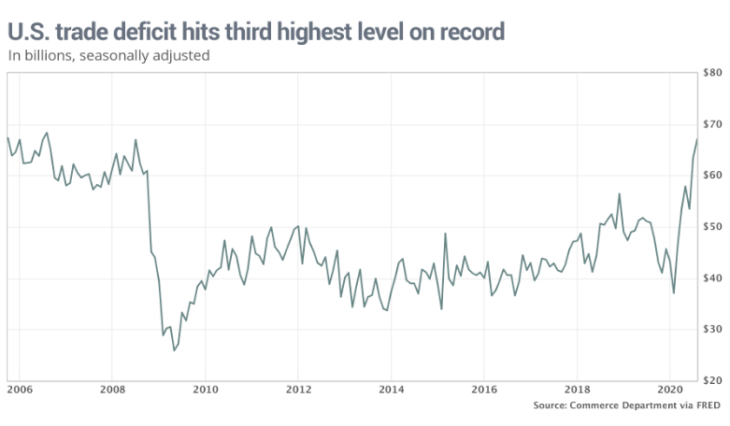In recent years, the US government has imposed tariffs on a number of nations, notably China. The administration argued that these policies would reduce our trade deficit. Many economists pointed out that the trade balance is basically domestic saving minus domestic investment, and that our highly expansionary fiscal policy would actually make the trade deficit larger. (Budget deficits tend to reduce domestic saving.) And this is exactly what seems to have happened since 2016:

Some of the products that were formerly exported from Chinese factories are now being produced in Vietnam. With a growing Vietnamese trade surplus, the US government has now accused Vietnam of currency manipulation. Here’s the FT:
Vietnam had been one of the rare beneficiaries of Trump’s trade war with China — until now.
Last Friday, the US administration announced late in the evening that it would launch a section 301 investigation — the same process it used to place tariffs on billions of dollars of Chinese imports into the US — to examine the country’s “unfair currency practices”.
Why might the trade bods of the Trump administration be interested in Vietnam? The administration’s tariffs on China have not done much to persuade companies to move their manufacturing back to the US. Plenty have moved over to Vietnam instead, where they can secure cheap labour.
In the past, currency manipulation charges were based on a specific set of rules developed by the Treasury Department. This no longer seems to be the case:
The inter-agency process here has left people in Washington scratching their heads. Traditionally, the US Treasury is in charge of international financial policy, and it would be it that would decide if another country was intervening in its exchange rate or not. As Mark Sobel, former Treasury official, has pointed out, there are all sorts of reasons that an emerging market currency might be undervalued against the dollar without necessarily indicating government manipulation.
Now the process of labeling a country a currency manipulator seems purely discretionary, based on whether we are annoyed by a country’s trade surplus. In a recent Mercatus paper, I argued that “currency manipulation” is not a useful concept.
Until the US addresses its saving/investment imbalance, we will continue to run large deficits. Like a game of whack-a-mole, shutting down imports from one country will merely expand the trade deficit with other countries.


READER COMMENTS
Thomas Hutcheson
Oct 9 2020 at 9:01am
The more fundamental question is why anyone should be concerned about a trade “imbalance.” It has no bearing on whether the fiscal deficit is sub-optimally high or not or whether there are distortions that cause the private savings rate to be sub -optimally low.
But IF for some reason one is “concerned” about the trade deficit, one should favor reducing the fiscal deficit with a shift toward consumption taxation, say by replacing the wage tax earmarked retirement income and health insurance with a VAT, or a revenue positive increase in income and inheritance tax rates and higher or no limits on 401k type savings.
It’s Tinbergen all the way down.
Michael Sandifer
Oct 9 2020 at 11:04am
This is another step toward banana republicanism. Most economists in banana republics know how to vastly improve economic policy, but they are ignored. Dysfunctional societies ignore expertise.
Jose Pablo
Oct 11 2020 at 12:20pm
You said:
“Dysfunctional societies ignore expertise.”
Actually, what normally happens is that “Experts create very dysfunctional societies”.
The one-child policy is the product of “experts”
The tax-code crazyness is the product of “experts”
LTCM was the product of the best “expert” on the field
Interest rates increases during the Great Depression were the product of “experts”
Very relevant “experts” were the leading voice in eugenics (now we have to rename buildings and remove statutes because of that … and might very well be soon in the position of burning “inappropriate” experts’ books in the public squares)
Central Planning is an almost sure recipe for dysfunctionality and most experts are supporting “central planning” most of the time.
Beware of experts. Average grand mothers’ advice is normally much more sensible. Heuristic is far superior to “experts”.
Iskander
Oct 10 2020 at 10:27am
How long do you think currency depreciation has real effects?
In the 1920/30s loads of countries were accusing the Japanese of currency manipulation. For example, Japanese firms were buying Indian cotton, shipping it to Japan, making textiles from it there, shipping it back and undercutting Indian firms in their home market despite paying quite large tariffs.
This was citied as proof of manipulation, yet there was rapid productivity growth in Japanese factories, unmatched by Indian firms despite both using the same machinery!
It seems that real factors matter much more than nominal ones, which is the sensible view.
Scott Sumner
Oct 10 2020 at 1:18pm
It makes no sense to talk in the abstract about the effects of currency depreciation; that’s reasoning from a price change. When the depreciation is caused by easy money, it does not typically improve the trade balance, as the income effect (growth boosting imports) offsets the substitution effect (cheaper exports.)
Comments are closed.